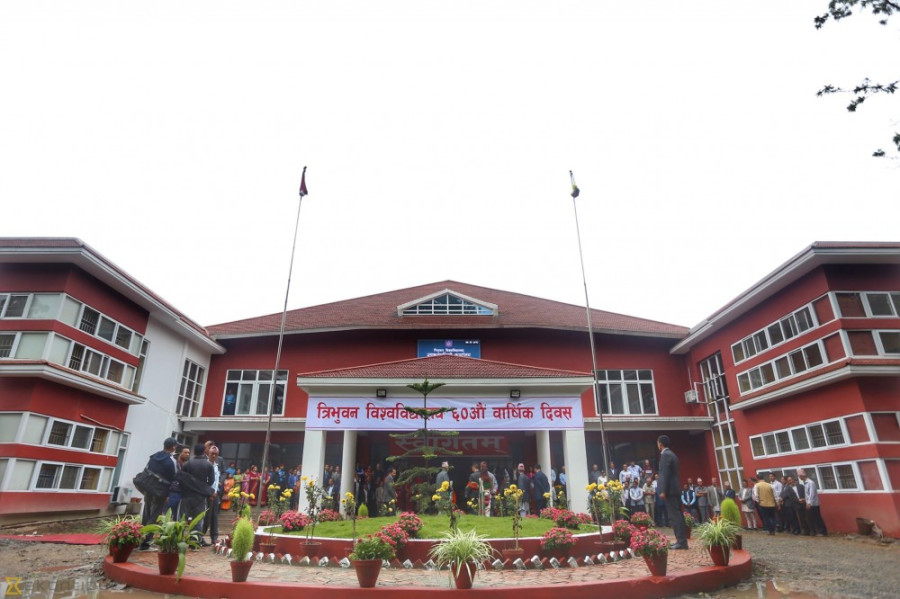National
Universities are headless as government fails to agree on vice-chancellors candidates
Nepali Congress-affiliated professors’ union threatens non-cooperation in universities if they are ignored in the appointment process.
Binod Ghimire
Top jobs in more than half a dozen universities, including Tribhuvan University, have been lying vacant for nearly two months as the government struggles to appoint vice-chancellors due to a lack of a political consensus, say government officials.
“If the prime minister and education minister had been on the same page, the university would have already gotten its executive head,” a senior official at the Ministry of Education told the Post on condition of anonymity.
Read: Despite concerns, top officials in universities are set to be appointed on political sharing
It has been 11 days since three names were recommended to Prime Minister KP Sharma Oli as possible candidates for the post of vice-chancellor at Tribhuvan University, but no progress has been made so far. Dr Bhagwan Koirala, Dr Dharma Kant Banskota and Chandra Mani Poudel were recommended for vice-chancellor at Tribhuvan University.
Among the eight universities that have been without executive and administrative heads since the third week of August, names have only been recommended for Tribhuvan University. Search committees formed to recommend names for the other seven universities haven’t yet found appropriate persons to lead the universities, said the Ministry of Education official.
Read: Vice-chancellors retire in different universities next month
The laws regulating Nepal’s universities mandate that the prime minister, as ex-officio chancellor, must appoint vice-chancellors from among names recommended by search committees led by the Education Minister.
The committee led by Minister for Education Giriraj Mani Pokharel has recommended Koirala, a pioneering cardiac surgeon, as their first choice for vice-chancellor. However, Banskota, former chairperson of the Nepal Medical Council, is Oli’s favourite as he hails from the prime minister’s home district of Jhapa. Banskota was appointed chair of the council under the CPN-UML quota, which was Oli’s party before its merger with the CPN (Maoist Centre) to form the Nepal Communist Party.
Along with the vice-chancellor, the positions of rector and registrar are also shared among the political parties in direct proportion to their political clout.
Four years ago, when Sushil Koirala was leading the government, the highest number of portfolios went to the Nepali Congress. Vice-chancellors of Tribhuvan University, Purbanchal University, Nepal Sanskrit University, Far Western University and Lumbini Buddhist University were appointed on the Congress quota.
The CPN-UML had its appointees at Pokhara University and Mid-Western University, while Agriculture and Forestry University was allotted to the CPN (Maoist Centre). The Maoists also got the Open University later on.
In universities where the Congress has its vice-chancellors, the positions of rector and registrar were given to the UML and the Maoists. While the Nepal Communist Party itself is struggling internally with UML and Maoist factions, the opposition Nepali Congress is also demanding its share.
Jagat Timilsina, chairman of the Democratic Professors’ Association which is affiliated with the Congress, has asked the government to keep in mind that the association commands a majority among professors in all universities.
“The association will resort to non-cooperation if we are ignored in the appointment process,” Timilsina told the Post. “Even holding examinations will not be possible without our support.”
The association has asked Congress President Sher Bahadur Deuba to place pressure on the government to make appointments as per political consensus.
The main opposition party is eyeing vice-chancellor posts in at least three universities, equal to those given to the UML and the Maoists during Koirala’s time.
The officials of the search committee say their quest to find better people to lead the universities is delaying the recommendation.
“We are against the political sharing though the consultation could be held with different professors association,” Usha Jha, a member of the National Planning Commission and a member of a search committee, told the Post.
The leaders of the professors, however, aren’t convinced with Jha’s claim. They say it would be a big surprise if there’s no political sharing of positions lying vacant.
“I fail to believe that there would be no sharing this time. I am sure, the sharing within the NCP and with the main opposition is delaying the appointment process,” said Rameshwor Upadhyay, a former chairman of Nepal Professors Association, an umbrella body of the university teachers, told the Post.




 20.12°C Kathmandu
20.12°C Kathmandu














